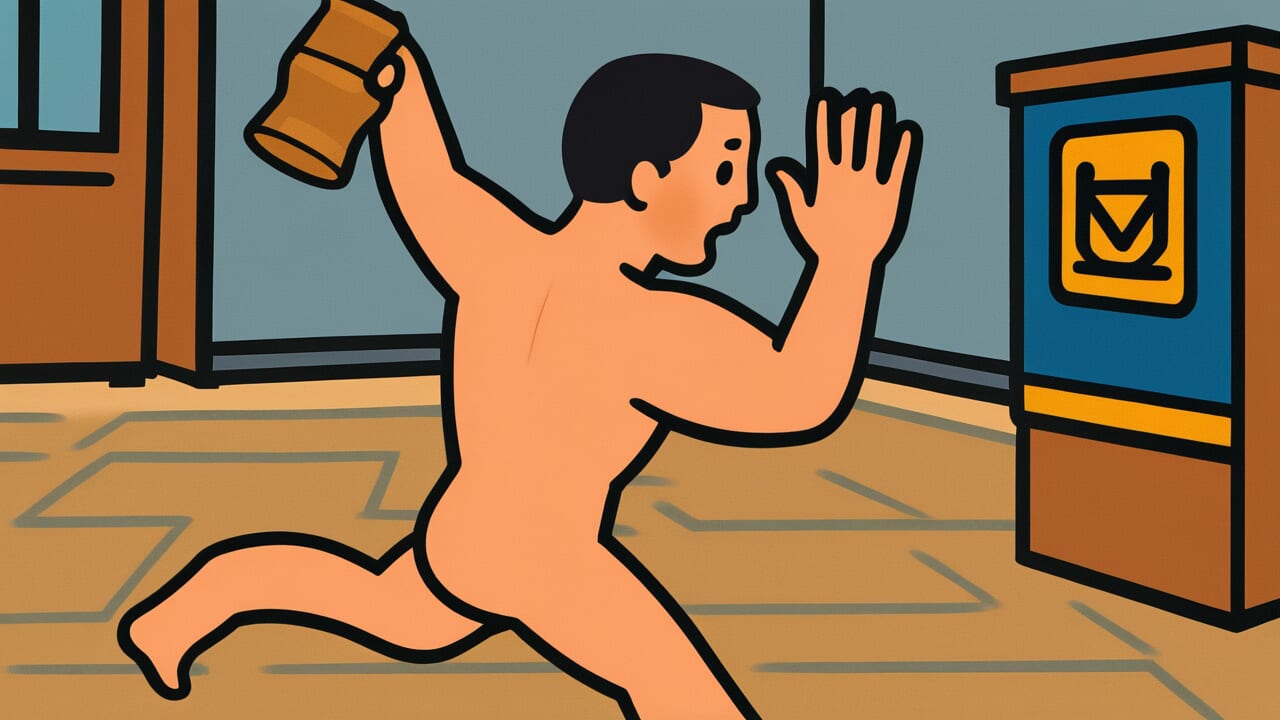How to Read “No one drops things when naked”
hadaka de mono wo otosu tameshi nashi
Meaning of “No one drops things when naked”
This proverb means that people who own nothing have no worries about losing anything. They can live without stress.
Being naked means owning nothing at all. If you don’t have anything to begin with, you can’t lose anything. This is a paradoxical truth that the proverb teaches.
People who own property, status, or honor constantly worry about losing these things. They live with anxiety and fear.
But people who own nothing from the start don’t have such worries. This isn’t just sour grapes. It expresses the freedom that comes from being released from the burden of ownership.
Even today, people use this saying when having more doesn’t lead to happiness. It reminds us that being unburdened can be more valuable than being weighed down by the fear of loss.
Origin and Etymology
No clear historical records explain where this proverb came from. However, we can learn interesting things by looking at how the words work together.
“Naked” literally means wearing nothing on your body. But in Japanese, this word has long been used metaphorically to mean “owning nothing” or “having nothing.”
The phrase “hadaka ikkan” (starting from nothing) is still used today. The word “naked” provides a very clear image when expressing a state of having no property or status.
“Dropping things” is also interesting. This doesn’t just mean physically dropping something. It means losing something precious or losing your fortune.
“Tameshi nashi” means “there is no example of this.” It expresses a strong negation.
This proverb probably came from the everyday wisdom of common people during the Edo period. Society back then had a clear divide between those who owned property and those who didn’t.
People with property constantly worried about theft, fires, or business failures. Meanwhile, people who owned nothing from the start had a paradoxical sense of ease. They had nothing to lose in the first place.
This folk wisdom crystallized into these simple, memorable words. That’s how this proverb was likely born.
Usage Examples
- I lost everything when my business failed, but no one drops things when naked—I actually feel lighter now
- When I see people worrying about their wealth, I remember the saying “no one drops things when naked”
Universal Wisdom
“No one drops things when naked” offers deep insight into the relationship between ownership and anxiety. Why do people fear losing things once they own them?
This relates to a fundamental human psychological mechanism. The moment we acquire something, we recognize it as “ours.” It becomes part of our identity.
Property, status, reputation, relationships—these things exist outside ourselves. But we gradually feel “I’m not myself without them.”
Ownership inevitably creates fear of loss. The more you own, the more you must protect. Your anxiety about losing things grows accordingly.
Rich people suffer from worries. People in power become paranoid. This pattern of human behavior never changes across time and place.
This proverb has been passed down through generations because our ancestors learned from experience. Ownership and happiness don’t always go hand in hand.
Having nothing certainly brings inconvenience. But it also brings freedom from the fear of loss. This paradoxical wisdom continues to resonate with people across the ages.
When AI Hears This
The human brain sets a reference point the moment it enters a state of “having something.” According to prospect theory in behavioral economics, the pain of losing something is about 2.25 times stronger than the joy of gaining it.
In other words, losing 10,000 yen hurts more than twice as much as gaining 10,000 yen feels good.
What’s interesting about this proverb is that it points out something crucial. In a naked state—a state of zero—no reference point exists in the first place.
If you have nothing, you have nothing to lose. The concept of loss only emerges when you have a baseline for comparison.
For example, someone with no savings doesn’t fear their savings decreasing. But the moment they save even 10,000 yen, that becomes their reference point. Now they fear it dropping to 9,000 yen.
Even more interesting is the “endowment effect.” Once people own something, they show excessive resistance to letting it go.
In experiments, people who received a mug demanded an average of $7 to give it up. But buyers would only pay $3 for the same mug. The value more than doubles the moment you own it.
This proverb figured out something remarkable hundreds of years ago. The strongest strategy for staying free from the pain of loss is to never own things in the first place.
Lessons for Today
This proverb teaches us to reconsider the relationship between ownership and happiness. Modern society encourages us to “have more.” But owning more doesn’t just increase joy.
It also increases the hassle of management, maintenance costs, and anxiety about loss.
Look back at your own life. How much do you really need? In most cases, we hold onto more than necessary. We spend enormous energy protecting these things.
Sometimes letting go intentionally can lead to a freer, lighter way of living.
This isn’t an extreme teaching that says “own nothing.” What matters is understanding the cost of ownership. Then choose wisely what truly has value.
Don’t let fear of loss control you. Be grateful for what you have now, but don’t cling to it too tightly. Maintain a flexible heart.
That’s the quiet but powerful message this proverb offers to those of us living in modern times.


Comments